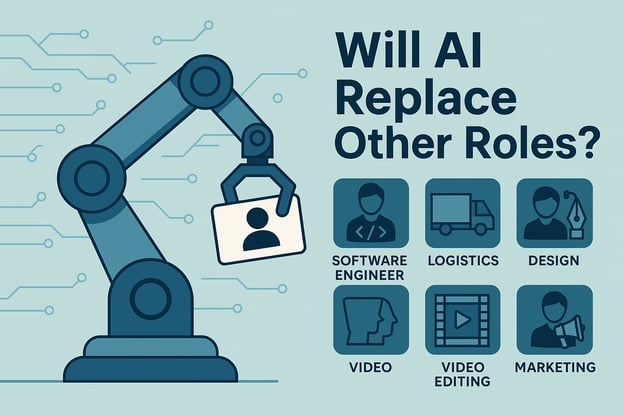Will Software Engineers Be Replaced by AI?
AI will eventually replace software engineers—along with many other roles across industries
Adriana Barrera
3/1/20251 min read


The rise of artificial intelligence isn’t just transforming the way we work—it’s reshaping entire industries. And while the spotlight often shines on software engineers, the reality is broader and more unsettling: AI won’t just replace coders—it’s on track to disrupt thousands of roles across logistics, design, marketing, and beyond.
Let’s explore how and why this is happening—and how businesses can adapt instead of disappear.
🧠 What AI Can Already Do (Spoiler: A Lot)
AI has advanced far beyond writing code or answering emails. Today’s AI models:
Design full websites from prompts
Generate ads, logos, and social posts
Create, cut, and caption videos
Write legal documents and contracts
Plan optimal delivery and inventory routes
Replace entire teams with automation workflows
And yes… they also write better and faster code than many humans.
👩💻 Roles Already Being Impacted by AI
Here are just a few job categories being transformed—or eliminated—by intelligent systems:
🔍 What AI Can Do Better Than Humans
Generate content 100x faster
Analyze thousands of variables instantly
Work 24/7 without fatigue
Detect patterns and anomalies invisibly
Execute repetitive tasks with 0 errors
🛑 But It’s Not About Replacing People — It’s About Replacing Processes
AI isn’t coming just for jobs—it’s coming for entire workflows:
No need for a team of 5 marketers when 1 person and an AI stack can launch a campaign.
A solo founder can now build an app without hiring developers.
Small agencies can outcompete large firms using automation.
AI doesn’t take your job. The person using AI better than you will.
🛡️ Adapt or Be Automated
The new rule in business is simple:
Either you use AI, or someone uses it against you.
But don’t worry—we’re here to help.
🚀 Hire a Team That Knows How to Blend Human Talent + AI
At Victorian Vanguard Ventures, we build scalable, AI-accelerated solutions for modern businesses—from code automation to marketing systems, to full-stack platforms ready for the AI-first era.
✅ Faster development
✅ Lower costs
✅ Smarter strategy
